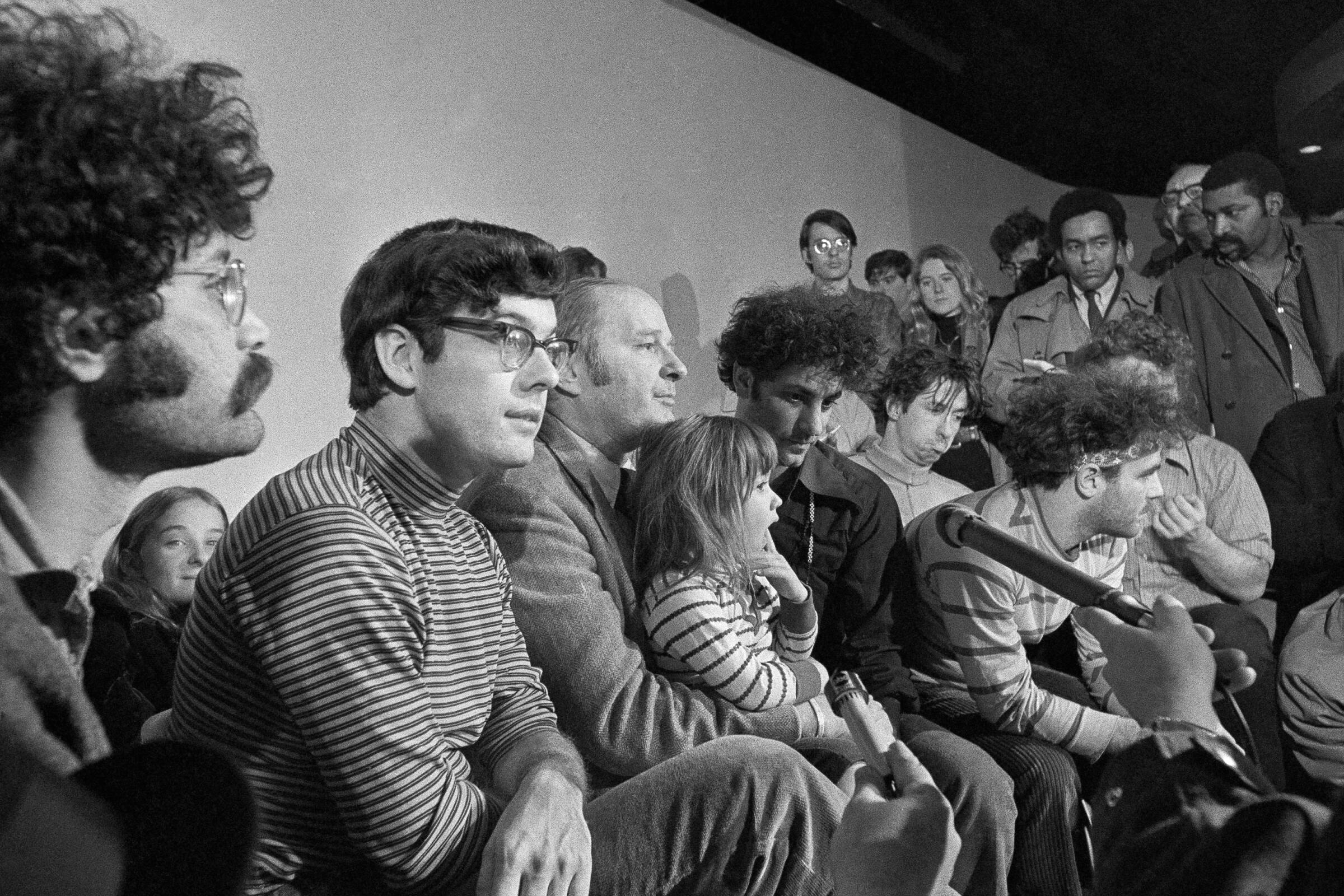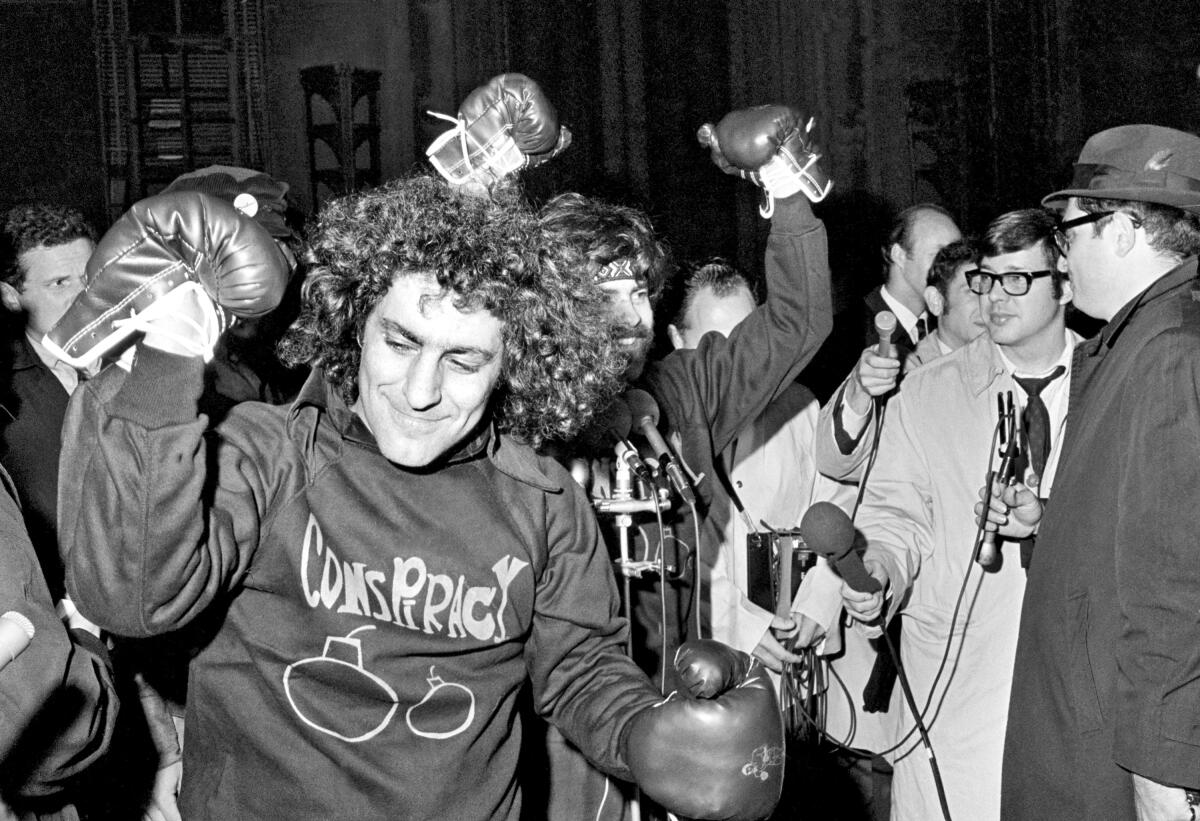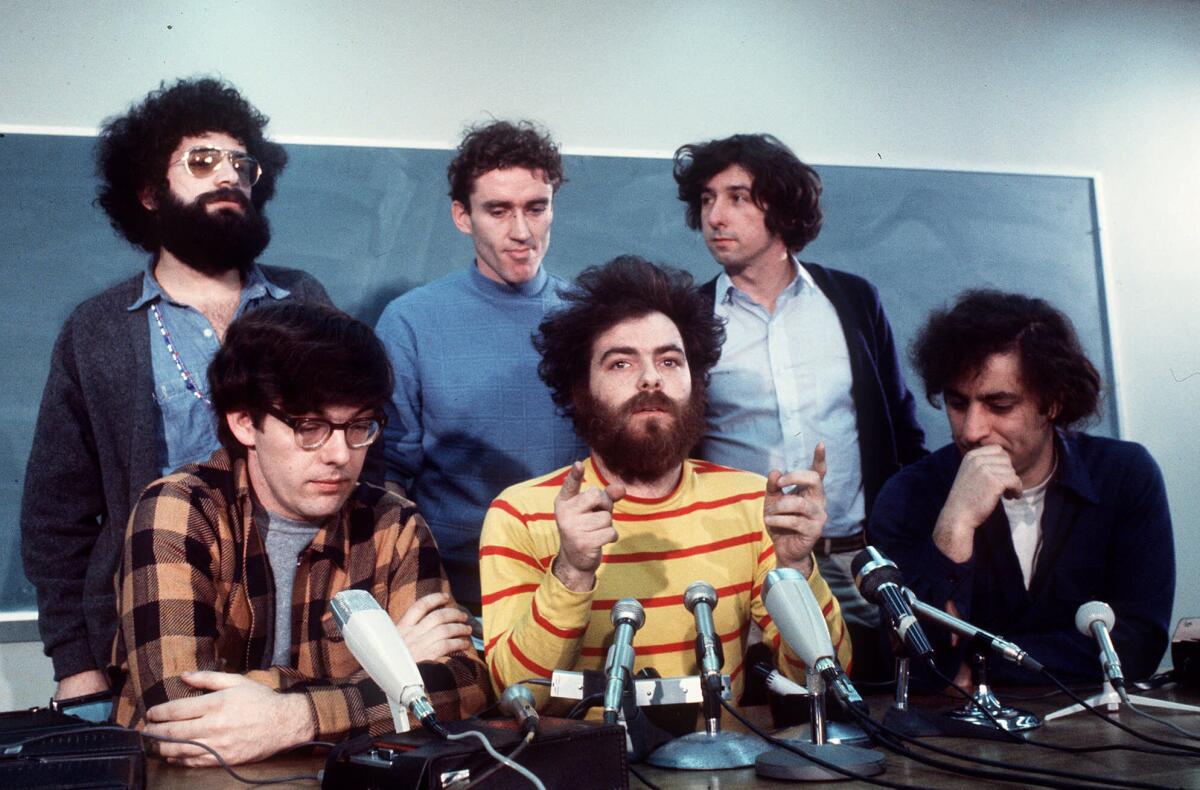Only good movies
Get the Indie Focus newsletter, Mark Olsen's weekly guide to the world of cinema.
You may occasionally receive promotional content from the Los Angeles Times.

On a Saturday morning 14 years ago, I was asked to come meet with Steven Spielberg at his house. He told me he wanted to make a movie about the Chicago 7 and would I be interested in writing it. I said, “Yes! The Chicago 7! I’d love to write a movie about the Chicago 7!”
As soon as I left his house, I called my father and asked him who the Chicago 7 were. I was just saying yes to working with Spielberg the way literally any member of the Writers Guild would. But over the next 14 years, my relationship to the story would change into something else.
I began the research — a dozen or so good books (some of them written by the defendants), a 21,000-page trial transcript and, most critically, time spent with Tom Hayden, who would pass away in 2016. It was through Hayden that I found the more personal story of his tension with Abbie Hoffman.
The film began to organize itself into three stories that I would tell at once: The courtroom drama; the evolution of the riot (how did what was supposed to be a peaceful protest turn into such a violent clash with the police and National Guard); and Tom and Abbie — two guys on the same side who couldn’t stand each other, with each thinking the other was doing harm to the cause. I’d gone from “a chance to work with Spielberg” to “a good story to tell.”
I had a problem, though — I didn’t get Abbie and it seemed like everyone else did. I’d get emails from people with Abbie Hoffman quotes that they thought were brilliant, clever and heroic. I thought he was a clown, not particularly clever, and I wasn’t seeing the heroism. I thought he was the worst kind of caricature of the left as seen by the right and I had the same problem with him that Hayden did.

Then I saw a piece of film. It was from a news conference that Abbie, along with his running buddy, Jerry Rubin, gave one day after court was adjourned. That day’s testimony had been about a joke Abbie made to David Stahl, Chicago’s parks director, when Abbie and Jerry were applying for a permit to protest at the Democratic National Convention in the summer of 1968. Stahl was horrified at what the two peace activists were telling him — the number of protesters he could expect and what their plans were.
Abbie said, “You could give me a hundred-thousand dollars and I’ll call the whole thing off.” Abbie was asked by a reporter if he would have taken the hundred grand to call off the protest. He said, “I’d have taken the hundred-thousand. As for calling it off … ,” he smiled and shook his head. Then a reporter asked him, “What’s your price?” Abbie didn’t seem to understand the question so the reporter asked again — “What’s your price?”
And in an instant, every drop of clownishness drained from his face, and he answered … ”My life.”
Here’s the thing. “My life” is a bad line of dialogue. It’s a clunky cliche that sounds like it was stolen from 10 different movies. There’s only one way you can get away with saying, “My life” — you have to really mean it. There can’t be a trace of bluster or affect or grandstanding. You can’t get away with it unless you absolutely mean it, and Abbie absolutely meant it.
“My life.” Stack that up against senators who aren’t willing to risk facing a primary opponent and tell me who the patriot is. I was on board with Abbie Hoffman.

Ten years, 22 drafts and three directors later, the “good story to tell” still hadn’t been told. Then we elected Donald Trump. When a protester would show up at a MAGA rally, Trump would get nostalgic about the old days when “they’d be carried out on a stretcher, folks” and they’d “knock the crap out of them” and “I’d like to punch him in the face.” And Steven felt the time to make “The Trial of the Chicago 7” was now. (I’d directed my first film by then — “Molly’s Game” — and Steven was pleased enough with it that he thought I should direct “Chicago 7.”) It had gone from just an opportunity to work with a great director, to a good story to tell, to a story that had sudden relevance. But last winter, when we were making it, we had no idea just how relevant it would get.
In May, after the police killings of George Floyd and Breonna Taylor, protesters hit the streets in cities across America. And in many of those cities, the protesters were met with clubs and tear gas. If you degraded the color of CNN’s coverage of the protesters clashing with police, it would look exactly like our archival footage from 1968.
And then the grand finale. Trump stood at a microphone and did exactly what the Chicago 7 were on trial for doing. That very conservative jury in Chicago would have taken all of 10 minutes to find him guilty, for the simple reason that they were conservative, they weren’t demented. Feb. 18 is the anniversary of the verdict in U.S. vs. Tom Hayden, Abbie Hoffman, Jerry Rubin, David Dellinger, Rennie Davis, Lee Weiner and John Froines (with a mistrial having been declared for Bobby Seale). The anniversary comes just five days after the verdict in U.S. vs. Donald Trump, the Proud Boys, the Boogaloo Boys, the Three Percenters and Fox News.
Abbie, forgive me for ever thinking you were a clown.
“The Trial of the Chicago 7” is now streaming on Netflix and will be available for free on Netflix’s YouTube page for 48 hours beginning Feb. 19 at 12 a.m. PT.
Sacha Baron Cohen, Jeremy Strong, Eddie Redmayne and Mark Rylance are among the ensemble of Aaron Sorkin’s sweeping historical drama “The Trial of the Chicago 7.”



Watch L.A. Times Today at 7 p.m. on Spectrum News 1 on Channel 1 or live stream on the Spectrum News App. Palos Verdes Peninsula and Orange County viewers can watch on Cox Systems on channel 99.
Only good movies
Get the Indie Focus newsletter, Mark Olsen's weekly guide to the world of cinema.
You may occasionally receive promotional content from the Los Angeles Times.